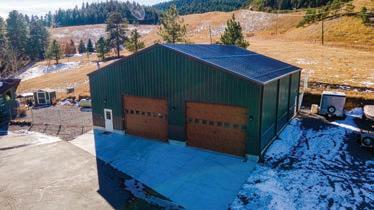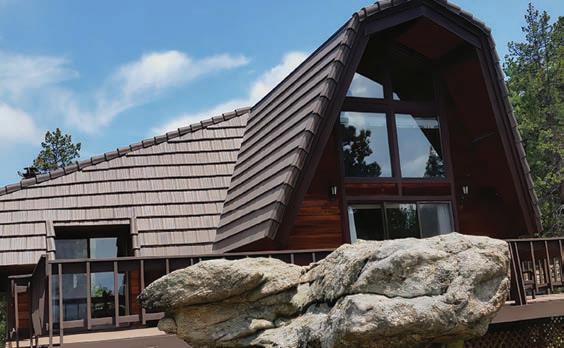
10 minute read
Insects in dramatic decline in Colorado, study finds
Numbers plummet over course of 35 years
BY WILLIAM ALLSTETTER THE COLORADO SUN
Dramatic insect declines previously reported around the world are also occurring in Colorado. Researchers with the Rocky Mountain Biological Laboratory, or RMBL, report that ying insects in the mountains outside of Crested Butte have declined more than 60% since 1986. e current research, published in the scienti c journal Ecosphere, is noteworthy for the length of time covered and the relatively undisturbed mountain environment where it was conducted. e declines correlated with drier and warmer weather, suggesting an impact of climate change.
“Increasingly we are seeing insect declines in places that are more pristine, which is much more alarming,” said Julian Resasco, assistant professor of ecology and evolutionary biology at the University of Colorado.
While historically seen as agricultural pests and personal nuisances, insects and other invertebrates (no backbone) are increasingly recognized for the vital services they provide in nature: pollination, pest control, nutrient cycling and sustenance for birds and other animals higher on the food chain. e continued decline of insect populations could have profound consequences for the environment, humans and other animals.
“We rely on insects for ecosystem services. We need them to be abundant and diverse,” Resasco said.

Concern about declining insect populations surged in 2017 after researchers reported that ying and the causes of insect decline are ongoing debates among entomologists.
For their study, the RMBL researchers set up a tentlike trap in the middle of a 27-acre meadow at the Rocky Mountain Biological Laboratory, 9,500 feet above sea level near the abandoned mining town of Gothic. Surrounded by the peaks and meadows of the Elk Mountains, the setting is stunning — and far removed from intensive agriculture, urban growth, pesticide use and other human activities that have been blamed for insect declines.
“We thought that it was important for us to look at a site that is free from all those in uences,” said David Inouye, co-author on the research paper, and a professor emeritus at the University of Maryland.
Two days a week, the researchers capture ying insects — mostly bees, wasps and ies. ey count and dry the insects, weigh them and divide them into several broad groupings. Since 1984, researchers have captured and recorded data about the insects every week of every subalpine summer for 40 years. e project has lasted so long that it has relied on three generations of scientists. Authors on the paper include the now-deceased originator of the work, Michael Soulé; David Inouye, who is spending his 53rd season at the laboratory this summer; and David’s son, Brian Inouye, and daughter-in-law, Nora Underwood, both professors of ecology and evolution at Florida State University. e paper analyzes 35 years of data, from 1986 through the summer of 2020. e researchers documented a 62% decline in the number of insects captured and a 49% decline in their total weight over the period. e insect decline was correlated with less winter snowfall, less summer rain and warmer temperatures.
“If you want to see a long-term trend, you need decades of data,” Inouye said. Insect populations can uctuate several fold from year to year. Data collected over a longer period helps identify less dramatic long-term trends. e current study is the longest controlled study of insects in Colorado and one of the longest in the United States.
Average annual snowfall at the laboratory fell sharply during the study period, to 344 inches per year from 463 inches. Abundant winter snow cover provides protective insulation to overwintering insects. Average summer rainfall did not change signi cantly during the study’s 35 years, but years of low summer rainfall had fewer insects. Summer rainfall promotes plant growth that feeds many insects. Average temperature rose about 2 degrees Fahrenheit during the study period and was correlated with the insect decline, although less so than precipitation.
“Changes in precipitation and warmer temperatures are expected to continue under climate change,” the researchers wrote in their report. “ us, continued insect declines might be expected even in relatively undisturbed habitats.”
“We should be concerned,” Underwood said. “ ere are a lot of cascading e ects of insects.”
Fewer insects can mean less food for other animals, fewer owers pollinated and fewer nutrients recycled through the environment. Underwood does have faith in the resilience of nature and is not predicting an imminent insect apocalypse or deserts in the mountains. But she notes that the study documents big changes occurring to important players in the environment with likely, but unknown, impacts occurring as climate change continues. is story is from e Colorado Sun, a journalist-owned news outlet based in Denver and covering the state. For more, and to support e Colorado Sun, visit coloradosun.com. e Colorado Sun is a partner in the Colorado News Conservancy, owner of Colorado Community Media. equipment upgrades/add-ons, and certain other add’l fees & chrgs. See directv.com/directv-fees/ for additional information. $10/MO. AUTOPAY AND PAPERLESS BILL DISCOUNT: Must enroll in autopay & paperless bill within 30 days of TV activation to receive bill credit starting in 1-3 bill cycles (pay $10 more/mo. until discount begins). Must maintain autopay/paperless bill and valid email address to continue credits. DIRECTV SVC TERMS: Subject to Equipment Lease & Customer Agreements. All o ers, packages, programming, promotions, features, terms, restrictions and conditions and all prices and fees not included in price guarantee are subject to change without notice. Package, Advanced Receiver Service Fee, Regional Sports Fee (varies by zip code) and equipment fees for TV connections are included in two-year price guarantee. Taxes, surcharges, add-on programming (including premium channels), protection plan, transactional fees, and Federal Cost Recovery Fee are not included in two-year price guarantee. Some o ers may not be available through all channels and in select areas. Di erent o ers may apply for eligible multi-dwelling unit. Visit directv.com/legal/ or call for details. Access HBO Max through HBO Max app or hbomax.com with your DIRECTV log-in credentials. Visit directv.com to verify/create your account. Use of HBO Max is subject to its own terms and conditions, see hbomax.com/terms-of-use for details. Programming and content subj. to change. Requires account to stay in good standing. Upon cancellation of your video service you may lose access to HBO Max. If you cancel your service, you will
Underwood invokes the rivet hypothesis by famed biologist Paul Ehrlich, for whom both she and Brian worked during summers when he came to RMBL. An airplane has thousands of rivets holding it together. You can remove one rivet without causing any trouble. But if you keep removing rivets — or insects — eventually the plane will fall apart and crash. No one knows which is the crucial rivet, and maybe it is best to keep as many as possible.
David Inouye believes the insect declines in Colorado and around the nation may have already rippled through the environment. In 2019, researchers reported an alarming 29% decline in North American birds, a net loss of 3 billion birds, since 1970. Birds that feed on insects were a prominent portion of those losses. Around the Rocky Mountain Biological Laboratory, researchers have likewise documented a striking decline in white-crowned sparrows, an insect-eating bird whose distinctive call is heard less often than in past years.
Insects and white-crowned sparrows are just one of several changes that David Inouye has observed in his decades at the laboratory. Moose and fox now live there year-round, and a Wyoming ground squirrel has moved up from lower-elevation Almont, to Crested Butte and now the laboratory. Ticks and mosquitoes that can carry West Nile virus have also appeared around the laboratory in recent years. Wild owers are blooming earlier.
“I think in the long term, most people are going to nd those changes undesirable,” he said.

Symptoms of West Nile virus
Symptoms of West Nile virus generally appear about two to 14 days after exposure, the county said. One in five people develop a fever, body aches, headache, and occasionally, skin rashes and swollen lymph nodes.
The county said mild symptoms of a West Nile virus infection usually pass on their own.
Less than 1% of people infected with West Nile virus will develop severe symptoms that affect the nervous system, Arapahoe County said.
People who are older than 60 are at a higher risk, as well as people with medical conditions like cancer, diabetes and hypertension.


Severe symptoms of West Nile virus include tremors, high fever, coma, neck stiffness, paralysis, muscle weakness, confusion and disorientation.
The state health department said residents who develop severe headaches or confusion should contact their health care provider.
12 confirmed human cases in Colorado, 1 death
The first human case of West Nile virus in Colorado for 2023 was confirmed in late July in La Plata County, according to the state health department.
As of Aug. 4, 12 people have been affected by West Nile virus in Colorado in 2023, according to data from the state health department.
The Weld County Department of Public Health and Environment confirmed on Aug. 4 the first death of someone due to West Nile virus in Colorado in
2023. In a news release, Weld County said a 53-year-old resident died from neuroinvasive West Nile virus.
The state health department said mosquito populations are at “historic levels” in some parts of Colorado due to the high rainfall this year.
“This unusually high mosquito activity along with known presence of the virus has caused an elevated risk of West Nile virus transmission to humans,” the department said in a news release.
7 Colorado counties have infected mosquitoes
Arapahoe County is among seven counties in Colorado that have confirmed West Nile viruspositive mosquitoes, the county said.
In July, environmental health experts detected West Nile virus in mosquitoes near the Arapahoe County Fairgrounds, marking the first known presence of the virus in the county this year. The county said efforts to treat the surrounding area with insecticide were effective. Environmental health specialists conducted a follow-up test to the same pool where the infected mosquitoes were found, and the samples reportedly came back negative.
However, in early August, it was announced that mosquitoes near Heritage High School in Littleton had tested positive for the virus.

“The season for high mosquito activity typically runs through September, so public health experts caution that our community has a while to go before West Nile (virus) risk peaks and declines,” the county said in its news release.
Those interested in learning more about West Nile virus can visit cdc.gov/westnile.






LS@LSPaintinginc.com










Help Wanted
Full Time Live-In Nanny Castle Rock, Colorado (40-45 hours per week)
Schedule – For two boys ages
5 & 8. School year (Aug-May) work schedule will primarily be on weekdays 6:30am-8:30am & 3pm8pm. Individual will have to have valid Colorado driver’s license to transport boys to and from school and other extracurricular activities. We will provide a vehicle for this use as well as limited personal use. For Summer break (End of May through beginning of August) this individual will watch the kids 9am-6pm MonFri. Also allowed flexibility with the option to switch days or hours for weekends occasionally.
Primary Responsibilities - Feeding and prepping boys for school every weekday morning. Making sure they have packed snacks. Driving and picking up every weekday to and from school. Driving to Kumon twice a week. Assisting in their school and Kumon assignments. Getting them fed, showered and ready for bed. Assisting in piano practice for 30 minutes every morning. All boy’s laundry to include changing their bed linens and bath towels once a week. Doing all dishes for yourself and kids after each meal. Participate in outdoor activities i.e. playing at the park, riding bikes, swimming, sledding, walking, or going to the rec. center. Reading books. Doing arts and crafts. Portuguese as 2nd language preferred to continue to teach boys Portuguese as a second language. Integrating bilingual communication in everyday activities (if applicable). $37,000 annual salary paid in weekly increments. Provided bedroom and attached bathroom at the employer’s residence is provided. If interested please email your resume to employer, Lindsey Donakowski, at lindsey.mayer@gmail.com
Help Wanted
Educational Audiologist
Part-Time
East Central BOCES is looking for a part-time Educational Audiologist for the 2023-24 school year. CDE Special Services and Colorado Audiologist licensure required; CCC’s or AAA certificate; knowledge of current technologies in Audiology including HAT systems and cochlear implants preferred. Experience with children 0-21 preferred. Complete evaluations, provide direct services, and consultation services, manage hearing equipment and oversee hearing screening program. Benefits include: a signing bonus, mileage reimbursement. Flexible scheduling with some opportunity to work from home. May be eligible for a loan forgiveness program. Ph.D. Salary $51,450-$60,550. For Questions, please contact Tracy at tracyg@ ecboces.org or 719-775-2342 ext.
101. To apply for this position, please visit our website ecboces.org and click on the “Jobs” page, click on the job you are interested in & then click on the grey button “Apply Online”, located at the bottom of the job listing. EOE
Help Wanted
SRE Engineer
(FT; Multiple Openings)
Job Location: Centennial, CO
Requirements: BS or equiv. in CS, IS, Math, etc. + 2 yrs. exp. req’d. Exp. w/UCaaS, Python, Bash, Java, JS, AWS, Cloudformation, Terraform, Linux OS, Jenkins, GitLab, CI/CD, Redhat & CentOS req’d. Salary: $127,200 Apply online at ringcentral. com/company/ careers
System Manager
CommonSpirit Health seeks System Manager, Payment Transformation in Englewood, CO to lead the accounting and performance analysis activities for value-based agreements (VBA) and initiatives. From $127,005/yr. Requires BS in Business Admin, Accounting, Finance, Healthcare or related or related and 3 years leadership exp, 5 yrs exp in Data Analysis in a Health Care setting. Position is remotemay live anywhere in US. Apply to kelly.enyart@commonspirit.org
Help Wanted
Full-Time
Registered Occupational Therapist/ COTA for 2023-24 School Year. OTR must have, or be eligible for appropriate Colorado licensure. Provide Pre-12 intervention, assessment, direct & indirect services just east of Denver on I-70, Bennett & Strasburg. Full Time Salary range: MA $50,450$56,050 PhD $55,700 -$61,300.
Part-Time Salary prorated based on the number of days employed. Excellent Benefits. Access to a company vehicle or mileage reimbursement. May be eligible for a loan forgiveness program! Flexible scheduling with the opportunity to complete some work at home. To apply for this position, please visit our website ecboces.org and click on the “Jobs” page, click on the job you are interested in & then click on the grey button “Apply Online”, located at the bottom of the job listing. EOE Questions contact Tracy at (719) 775-2342, ext. 101 or email tracyg@ecboces.org








